- Home
- Harry Harrison
Stars and Stripes In Peril sas-2 Page 10
Stars and Stripes In Peril sas-2 Read online
Page 10
“Can’t say that I do.”
“It’s a bureau that helps the former slaves. Pays their owners for their freedom. Then sort of guides them along in their new lives. Helps them getting jobs, getting land for farming, that sort of thing.”
“Seems a good idea, I suppose. I guess that you have to do something with them.”
“I am glad to hear that because, as you can readily imagine, there are some people that don’t agree with this work. People who don’t believe that the Negroes should be educated.”
“Well, I can truthfully say that I am of two minds about that myself. Not that I ever owned any slaves, mind you. But they might get above themselves, you see.”
Benjamin took his kerchief from his pocket and wiped his face. The sun was beating down on the tent and it was getting hot. “Well, it is the law, you might say. But unhappily there are some people who put themselves above the law. The slaves are free, their former owners have been paid for their freedom, so that should be that.”
“But it isn’t,” General Bragg said. “I can understand that. A man spends his life looking at the colored as a piece of property, why he’s not going to change his thinking just because he got paid some money. You can’t change the way things work overnight, that’s for certain.”
“There is much truth in what you say. But the law is still the law and it must be obeyed. In any case, there have been some threats of violence, while some of the Freedmen’s Bureaus have been burned. We don’t want the situation to get any worse. So we want to assign soldiers to the Freedmen’s Bureau to make sure that the peace in the South is kept. Which is why I am here to talk to you, to ask you to aid me in keeping the peace.”
“Isn’t that the work of the local lawmen?”
“It should be — but many times they don’t want to cooperate.”
“Don’t blame them.”
“Yes, neither do I, but it is still the law. Now you know, and I know, that the one thing we cannot do is to have any soldiers from the North come down here to do this kind of work. Keeping the peace.”
The general snorted loudly and called for more coffee, cocked his head and looked at Benjamin. “That sure would start the war all over again, I reckon. Start it even faster if you used black Yankee troops.”
“But we could use Southern soldiers. Texas soldiers by choice. The men of your brigade fought hard and well for the South and no man will doubt your loyalty. But there are few slaves in your state, even fewer cotton plantations. My hope is that Texicans would be more, say, even-handed in the application of the law. And certainly none in the South would fault their presence.”
“Yes, it’s a thought. But I can envisage a lot of problems coming up, a passel of problems. I think that I’ll have to talk to my officers about this first before I make any decisions. Maybe even speak to the men.”
“Of course. The men cannot be assigned against their will. And when you talk to them, please tell them that, in addition to their army pay, there will be separate payments from the Bureau. These men will be going home soon and I know they will surely like to take back as many silver dollars as they can.”
“Now that is an argument that makes powerful sense.”
“I’m pleased to hear that, General. Will it be all right if I send you a telegram tomorrow to find out about your decision?”
“You do that. Should know something by then.”
Judah Benjamin was buoyed by hope as he rode back to the capital. The road to peace and Negro freedom was proving not to be a very smooth one.
Jefferson Davis was very much of the same mind. The end of the War Between the States, the end to all the killing, had been a noble effort that had come through in the end. The killing had been stopped, that at least had been done, but it had been replaced by what was, in the least, becoming an uneasy peace. He must do something about it.
His wound had healed well, though he had little strength in his left arm; the surgeon had cut away muscle and tissue to get the pistol ball, and cloth, out of his wound. But the fever was a thing of the past now and his strength grew daily. Nevertheless the train trip to Arlington had been tiring. But Robert E. Lee had met him at the station himself, driving the buggy. The United States Government, which had seized Lee’s home because of unpaid taxes, had returned it to its rightful owner, slightly the worse for wear, at the war’s end. It had now been restored to its original condition.
Jefferson Davis had passed a restful three days before he felt up to riding again. Always a keen equestrian, the thing that he had missed most was his daily ride. Now that he could sit a horse again he felt stronger with every passing day. His hosts seemed pleased to see his health improving daily and he was aware of this fact. But he also did not want to wear out his welcome. Finally he was strong enough, he was sure, to ride from Arlington to the White House. He looked up from his breakfast as Lee came in.
“I had the gray mare saddled up,” Lee said. “She’s calm and sensible and a bit like riding in a rocking chair.”
“I thank you kindly. I’m still not fit enough to ride a sprightly mount like your Traveller. I think that I’ll be on my way now before the day heats up.”
The weather was fine, the sun warm — and despite the twinges of pain he still felt from his wound — he had the strength of a man on a mission. And the mare was slow and as steady as promised. He crossed the Potomac and turned down Pennsylvania Avenue. Apparently he must have been seen as he came up the drive, because as he approached the Executive Mansion, Lincoln himself came out on the steps to greet him.
“You are looking spry and fit, Jefferson. Seeing you here like this is the best news I could have ever received.”
“Better every day, Abraham, always better.”
Lincoln beckoned and one of the guards hurried forward to help Davis to dismount from his horse.
“Come into the green room and avoid the stairs,” Lincoln said. “Can I offer you some refreshment?”
“At this time of day I think a cup of tea would be most satisfactory.”
“Do you hear that, Nicolay?” Lincoln called to his secretary who was waiting in the hall. “And see that no one disturbs us after that.”
Jefferson Davis drank his tea — then spoke. “How goes this British intrusion into Mexico? I read the reports in the papers, but they are all wind and no meat. The newspaper writers wrap themselves in the flag and go on about the Monroe Doctrine and manifest destiny. But they seem to be a little light on facts.”
“That’s only because they have none. The surrounding jungle keeps news out and the enemy safe within. But all in all I would say that things are going as well as can be expected at this stage. It is not public knowledge yet, but guns and ammunition are reaching the Mexican army and their irregulars. On the diplomatic front things go much more slowly. Emperor Napoleon insists that they are in Mexico at the invitation of the people and makes reference often to the money owed to them. He wants the world to believe that the Emperor Maximilian was asked to rule by the people of Mexico. I doubt if anyone — other than Maximilian himself — believes such tosh.”
“And here at home? How goes the peace?”
He asked the question in a flat voice, but there was a tension behind his words that could not be concealed. Lincoln put his cup down and hesitated before he spoke.
“I wish I could tell you that everything is fine — because it is not. Though there has already been much progress right across the country, and particularly in the South. The economy is booming with the new mills and factories, the railways rebuilt, new rolling stock coming out of the train yards. New warships launched, others being built. But, as always, Congress is being difficult about the appropriations bill. And there is a strong movement to dispatch troops to Mexico to throw the British out. And the British seem to be up to their old tricks — sending arms to the West Indies, planning to retake the islands.”
“That’s all politics. I wasn’t talking about that. I was talking about the nigras and the South.�
��
Lincoln sighed. “I thought that you might be.”
“People come to see me. They tell me things that I don’t like to hear. The freed slaves are getting very uppity. They got schools going in their churches now, with teachers from the North teaching them how to read and write.”
“That is not against the law.”
“Well it should be. Who is going to work the fields while they are all in their schools and such and dilly-dallying and telling each other how great they are? And when they’re not in school they’re out there plowing a couple of acres for themselves. While the cotton just hangs in the fields and rots.”
“That is what the Freemen’s Bureau is for. They can aid the planters as well as the Negroes, they can find field hands…”
“I don’t see any Southerner of class going to those places, asking favors of carpetbagging Yankees and nigras.”
“It’s not quite like that. You can help, Jefferson. Talk to them, they know and respect you. Write for the newspapers, lead the way. We never thought that peace would be easy to obtain. But we have. Now we must hold it to our bosoms most strongly and not throw this golden opportunity away because of ancients hatreds…”
Lincoln broke off as Davis slowly stood up. “That’s not for me to do,” he said. “It is for you and your Mr. Mill to find a way out of this situation that you have created. And, I am most positive about this, it must be done soon.”
Lincoln could think of no response to that. He said a few polite words as he walked the former president of the Confederacy to the door. Watched in silence then as he slowly rode away.
General Escobeda was not a man who normally took chances. Those officers who fought the battles of the little war could not afford to leave anything to chance. Their enemies outnumbered them ten to one, outgunned them a hundred to one. Therefore they avoided fixed battles and planned their skirmishes in detail. It was a matter of hit and run, striking from their mountain strongholds, hitting hard then vanishing back to their safety.
Now Escobeda was taking a chance — but he had no choice. Almost as valuable as the guns and supplies that they carried, the sure-footed donkeys were always in short supply. Without their assistance life in the mountains would be impossible. They brought in food and water, carried out the wounded and the dead. But now Escobeda was forced to do what he did not want to do. He had brought together all the burros that he commanded, and was now leading them out of the safety of the mountains and across the plain to the north.
They moved only at night and by a circuitous route, avoiding the main pathways that led from Monterrey to the border. These were well patrolled by the French. Now the guerrilleros moved as fast as they could, until men and beasts stumbled with fatigue. Yet they still went on, fearful of the French troops, arriving just before dawn at the ford in the Rio Grande del Norte, the river just south of Laredo. Only the scouts went forward while the rest of them remained in a dry arroyo. Here the donkeys ate the hay that they had been carrying. The men slept. Only the guards and the general remained awake. Looking north.
“I see him, General,” one of the guards called out softly. “It is Victoriano.”
The scout appeared on the far bank and waved his hat. Escobeda signaled him to come over. He waded the sluggish river, stumbling with fatigue.
“They are there,” he gasped. “Many wagons pulled by giant mules. Many gringo soldiers as well.”
“We cross as soon as the scouts return. Here, take this.” He passed a small flask of caña over to him, the fiery spirit distilled from sugar cane. Victoriano mumbled thanks as he raised it to his lips.
The scouts returned; the trail behind them was clear. The tired animals brayed protests as they were prodded to their feet. Short minutes later they crossed the river and hurried, as fast as they could, to the safety of the Yankee soldiers.
The weapons and ammunition were waiting just across the Mexican-American border in Laredo, as had been promised. General Escobeda now sat outside the pulqueria, a mug of pulque mixed with pineapple juice in his hand, beaming with pleasure while the military weaponry, the rifles and ammunition, was transferred from wagons to donkey-back. One of the cavalry officers who had accompanied the wagon train was a Texican, Captain Rawlings, and he spoke passable Tex-Mex. Like most gringos he could not abide the foul smell of the fermented pulque, so drank instead its distilled version, mezcal.
“You aiming to attack Monterrey now you got these guns, General?” Rawlings asked.
“Not at once. But we will now be able stop their convoys, also wipe out any of them foolish enough to leave the city. Their patrols will be easy to ambush now that we have all these rifles and their ammunition. With great pleasure we will kill any of them stupid enough to poke their heads outside of the city’s gates. After that has happened they will stand on the thick walls and think themselves safe. Until we strike.” He patted his pocket. “In his letter President Juarez says that heavy cannon are on the way here right now. With these we knock down the walls and eliminate these vermin.”
Rawlings drained his mug and coughed heavily. “That sure is mean stuff,” he said when he got his voice back. “I wish you good luck. The French sure need teaching a lesson.”
“And the Austrians as well, those who garrison Monterrey. Will you be staying here, Captain?”
“Looks like it. I have orders for my company to ride cover for the guns when they get here and cross the border.”
“That is good. You can talk to them, for none of my soldiers speak English. I will leave two men here as guides.”
“You just do that.”
It was two weeks before the heavy artillery arrived, splashing through the shallows of the Rio Grande del Norte. After they had watered the horses they began the long, hot slog across the dry plains of Nuevo Leon. The horses pulled wearily on the heavy guns and limbers of ammunition and made slow progress. But the guides knew where to find the scattered villages where they could water the animals and feed them hay, so the march went smoothly, if slowly. They were a day’s march from Monterrey when they were joined by General Escobeda and his guerrilleros.
They waited for nightfall before they approached the city. The riflemen went forward to guard against any possible sorties being made by the enemy within; scattered fire went on through the night as they exchanged shots with the defenders on the city walls. All of that night the men labored hard. At dawn the only part of the guns that could be seen from the city were the muzzles protruding from the mounds of dirt that concealed the gun positions.
At first light a ranging shot was fired that blew a large gap in the city walls. The guerrilleros cheered mightily.
The siege of Monterrey had begun.
DISASTER!
The paddle wheel steamer SS Pawatuck was a venerable coaster, a familiar sight along the Gulf coast of the United States and the shores of Mexico. Through the years smoke had discolored her funnel and left its scars upon her deck. One of her paddlewheel covers had suffered damage against some wharf and had been only roughly repaired. For the most part her cargo was mining machinery taken to the port of Vera Cruz. Usually she made the return trip in ballast, though sometimes she managed to find a cargo of metal ingots. Mexican Customs officials rarely looked into her cargo hold, and certainly never into her engine room. They were much happier in the captain’s cabin, drinking his whisky and pocketing the silver coins of the mordida, the little bite, the bribe without which Mexico could not function.
Had they gone down the scruffy companionway and opened the hatchway that led to the engine room they would certainly have been surprised at its pristine condition. And certainly startled by the sight of the modern, powerful steam engine that was located there. They would have been more than startled to discover that the ship’s commander, Captain Weaver, was an Annapolis graduate and a lieutenant in the United States Navy. For this carefully scruffy vessel was in reality the USS Pawatuck, and all of her crew navy officers and naval ratings as well.
The crew w
as tired, the officers exhausted. None of them had had very much sleep in over twenty-four hours. The ship was just returning from a nighttime rendezvous with the guerrillero forces at Saltabarranca, where they had landed a cargo of ammunition and yet more breech-loading rifles. There had been treacherous sandbars offshore, and the ship’s keel had brushed over them more than once. But the donkey train had been waiting for them, and many hands made a quick job of unloading the military supplies. The tide was on the ebb before they had finished and only the lightening of the load had enabled the Pawatuck to leave without grounding herself.
Now, as she puffed slowly towards the quay in the harbor of Vera Cruz, the duty officer raised his binoculars to look at the man seated on a bollard where she was to berth.
“It’s that Irishman with the funny name, captain, the one we’ve carried before.”
“Ambrosio O’Higgins. We’re not expecting him, are we?”
“We’ve no orders, sir.”
O’Higgins was pacing back and forth as the ship drew close — he even grabbed the thrown line and wrapped it around a bollard. As soon as the gangway touched the dock he was up it and on deck, then he climbed quickly to the bridge.
“Captain,” he said, “is it possible to sail south as quickly as you can?”
“Possible, but not probable — we need coal…”
“I cannot tell you how important this is. I have had a message from the guerrillero forces about some construction further down the coast. I’m not sure exactly what is happening, but the message said it was most dangerous. That I should go there at once and see for myself. Might I see your coastal map, if you please?”
Captain Weaver crossed the chartroom and pointed at the opened chart on the table there. O’Higgins hurried to it, placed his fingertip on Vera Cruz and moved it south along the coast. “Here it is! A small fishing village they said, name of Coatzacoalcos.” He tapped the chart over and over. “Can we get to this place? Can we find out what is happening there?”

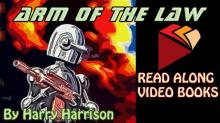 Arm of the Law
Arm of the Law The Velvet Glove
The Velvet Glove The K-Factor
The K-Factor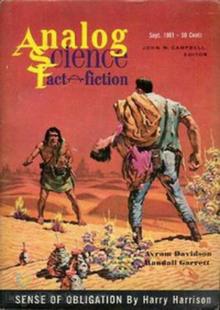 Sense of Obligation
Sense of Obligation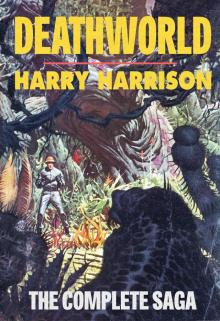 Deathworld: The Complete Saga
Deathworld: The Complete Saga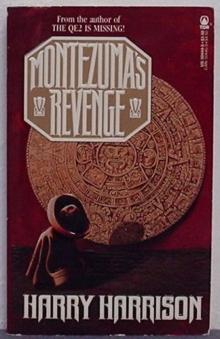 Montezuma's Revenge
Montezuma's Revenge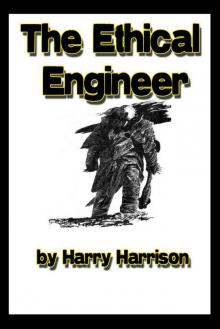 The Ethical Engineer
The Ethical Engineer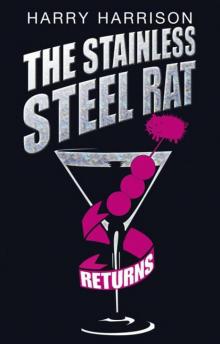 The Stainless Steel Rat Returns
The Stainless Steel Rat Returns The Misplaced Battleship
The Misplaced Battleship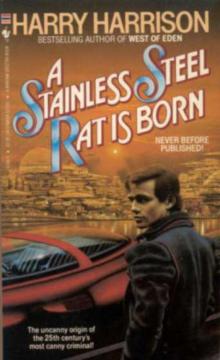 The Stainless Steel Rat is Born
The Stainless Steel Rat is Born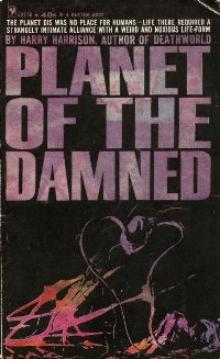 Planet of the Damned bb-1
Planet of the Damned bb-1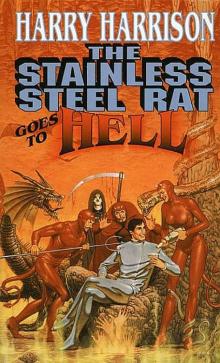 The Stainless Steel Rat Goes to Hell ssr-10
The Stainless Steel Rat Goes to Hell ssr-10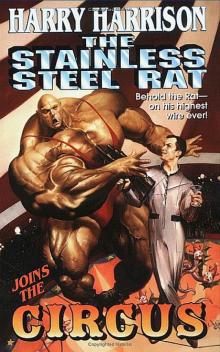 The Stainless Steel Rat Joins the Circus ssr-11
The Stainless Steel Rat Joins the Circus ssr-11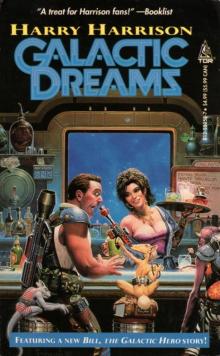 Galactic Dreams
Galactic Dreams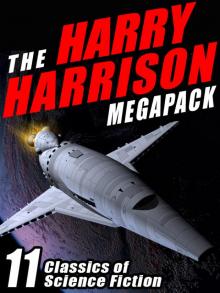 The Harry Harrison Megapack
The Harry Harrison Megapack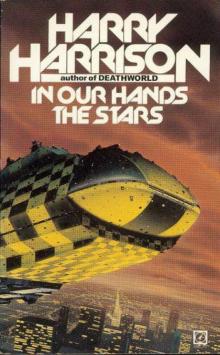 In Our Hands the Stars
In Our Hands the Stars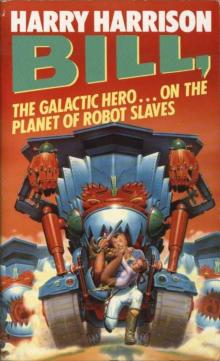 On the Planet of Robot Slaves
On the Planet of Robot Slaves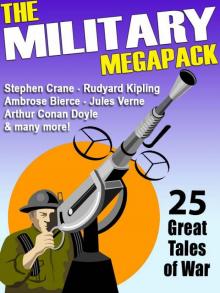 The Military Megapack
The Military Megapack Make Room! Make Room!
Make Room! Make Room! Wheelworld
Wheelworld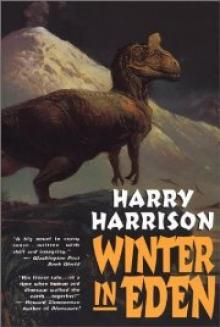 Winter in Eden e-2
Winter in Eden e-2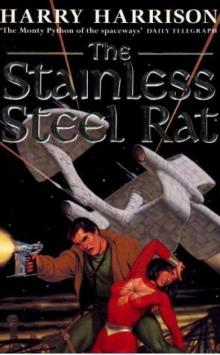 The Stainless Steel Rat
The Stainless Steel Rat The Stainless Steel Rat Goes to Hell
The Stainless Steel Rat Goes to Hell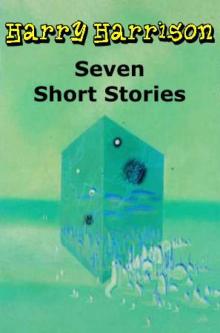 Harry Harrison Short Stoies
Harry Harrison Short Stoies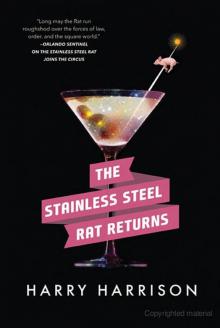 Stainless Steel Rat 11: The Stainless Steel Rat Returns
Stainless Steel Rat 11: The Stainless Steel Rat Returns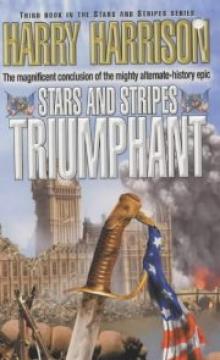 Stars and Stripes Triumphant sas-3
Stars and Stripes Triumphant sas-3 West of Eden
West of Eden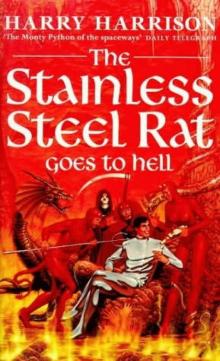 The Stainless Steel Rat Go's To Hell
The Stainless Steel Rat Go's To Hell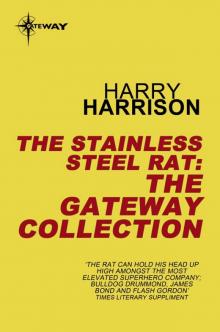 The Stainless Steel Rat eBook Collection
The Stainless Steel Rat eBook Collection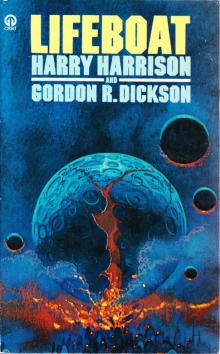 Lifeboat
Lifeboat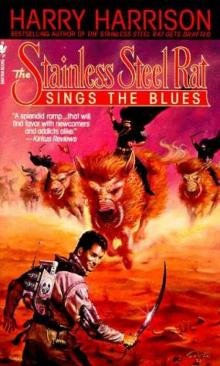 The Stainless Steel Rat Sings the Blues
The Stainless Steel Rat Sings the Blues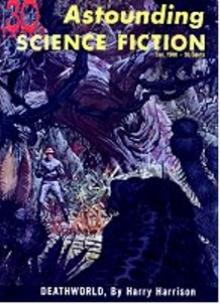 Deathworld tds-1
Deathworld tds-1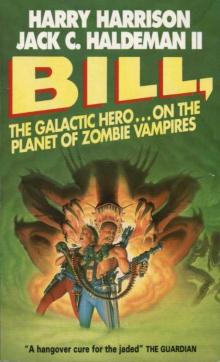 On the Planet of Zombie Vampires
On the Planet of Zombie Vampires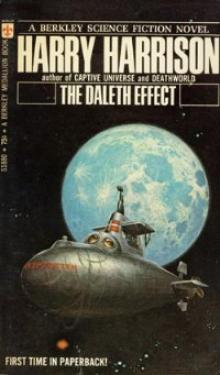 The Daleth Effect
The Daleth Effect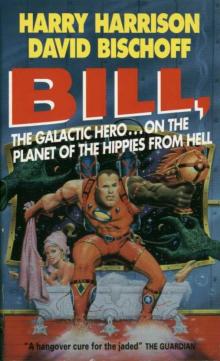 On The Planet Of The Hippies From Hell
On The Planet Of The Hippies From Hell The Turing Option
The Turing Option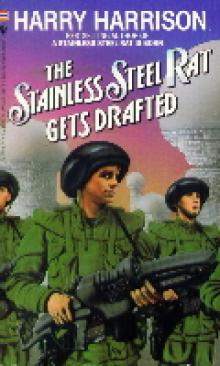 The Stainless Steel Rat Gets Drafted
The Stainless Steel Rat Gets Drafted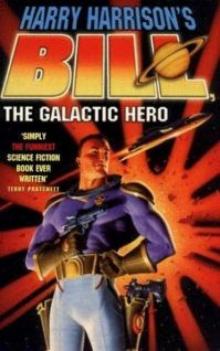 Bill, the Galactic Hero btgh-1
Bill, the Galactic Hero btgh-1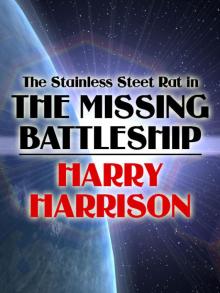 The Stainless Steel Rat in The Missing Battleship
The Stainless Steel Rat in The Missing Battleship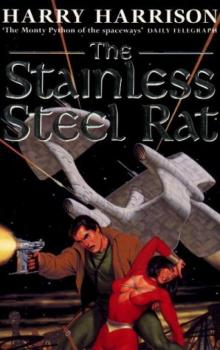 The Stainless Steel Rat ssr-1
The Stainless Steel Rat ssr-1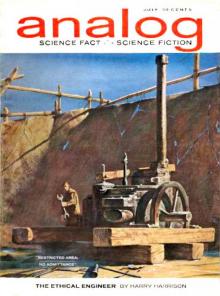 The Ethical Engineer (the deathworld series)
The Ethical Engineer (the deathworld series)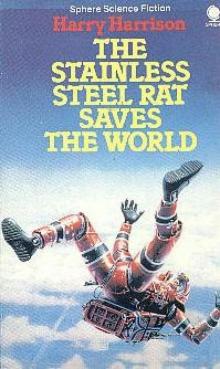 The Stainless Steel Rat Saves the World ssr-3
The Stainless Steel Rat Saves the World ssr-3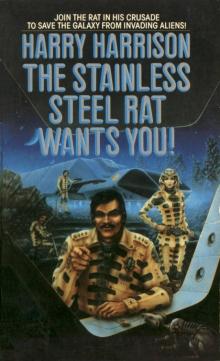 The Stainless Steel Rat Wants You
The Stainless Steel Rat Wants You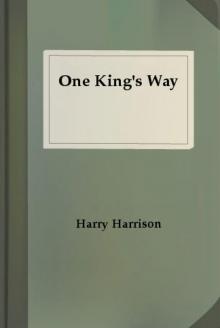 One King's Way thatc-2
One King's Way thatc-2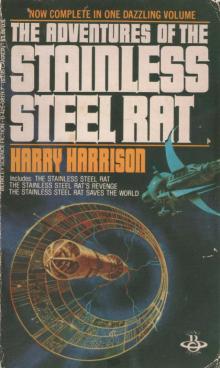 The Stainless Steel Rat Saves The World
The Stainless Steel Rat Saves The World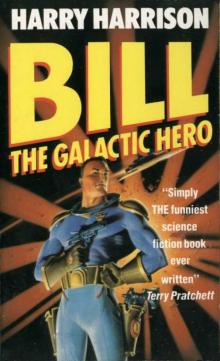 Bill, the Galactic Hero
Bill, the Galactic Hero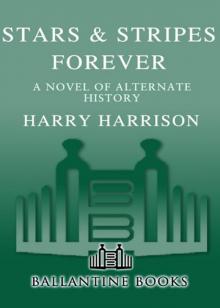 Stars & Stripes Forever
Stars & Stripes Forever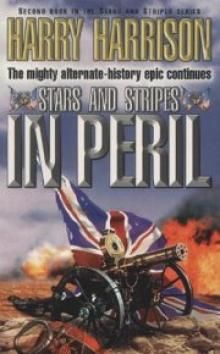 Stars and Stripes In Peril sas-2
Stars and Stripes In Peril sas-2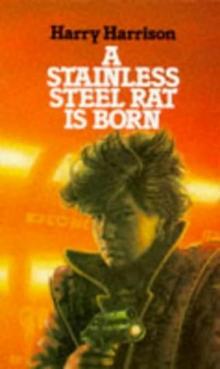 A Stainless Steel Rat Is Born ssr-6
A Stainless Steel Rat Is Born ssr-6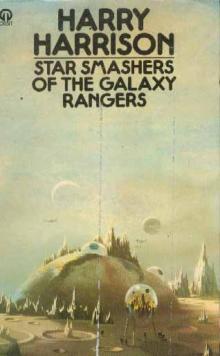 Star Smashers of the Galaxy Rangers
Star Smashers of the Galaxy Rangers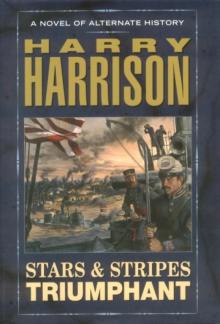 Stars & Stripes Triumphant
Stars & Stripes Triumphant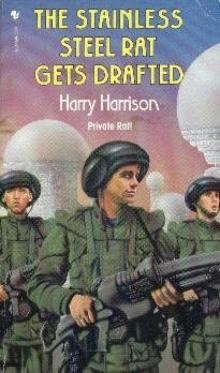 The Stainless Steel Rat Gets Drafted ssr-7
The Stainless Steel Rat Gets Drafted ssr-7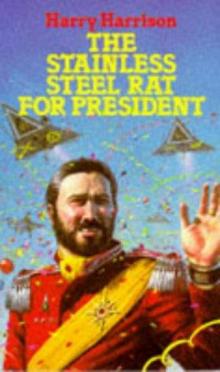 The Stainless Steel Rat for President ssr-5
The Stainless Steel Rat for President ssr-5 The Hammer & the Cross
The Hammer & the Cross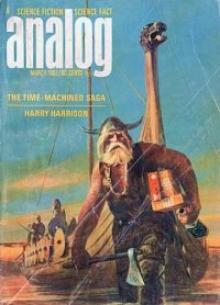 The Technicolor Time Machine
The Technicolor Time Machine The Hammer and The Cross thatc-1
The Hammer and The Cross thatc-1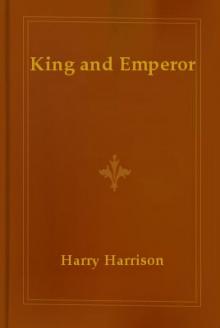 King and Emperor thatc-3
King and Emperor thatc-3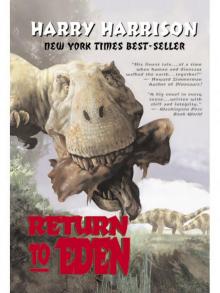 Return to Eden
Return to Eden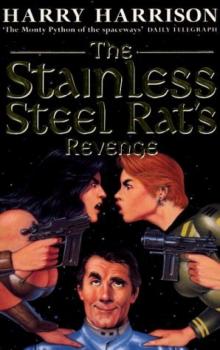 The Stainless Steel Rat’s Revenge ssr-2
The Stainless Steel Rat’s Revenge ssr-2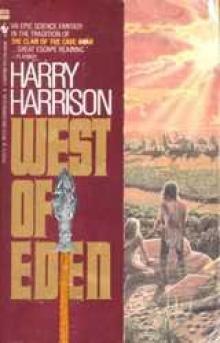 West of Eden e-1
West of Eden e-1 Return to Eden e-3
Return to Eden e-3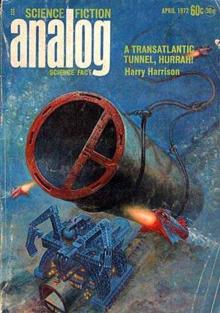 A Transatlantic Tunnel, Hurrah!
A Transatlantic Tunnel, Hurrah!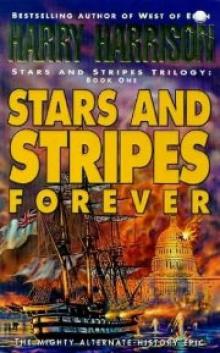 Stars and Stripes Forever sas-1
Stars and Stripes Forever sas-1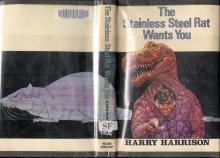 The Stainless Steel Rat Wants You ssr-4
The Stainless Steel Rat Wants You ssr-4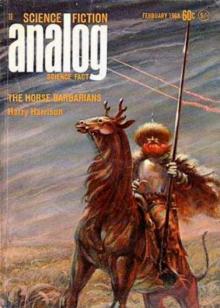 The Horse Barbarians tds-3
The Horse Barbarians tds-3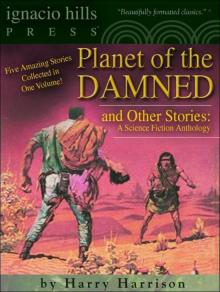 Planet of the Damned and Other Stories: A Science Fiction Anthology (Five Books in One Volume!)
Planet of the Damned and Other Stories: A Science Fiction Anthology (Five Books in One Volume!)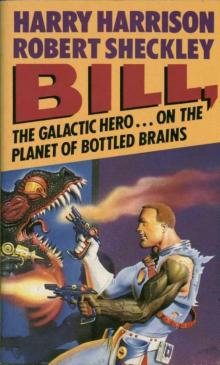 On the Planet of Bottled Brains
On the Planet of Bottled Brains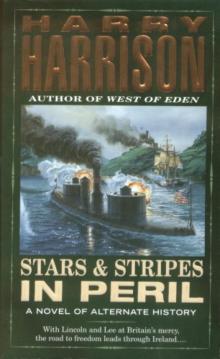 Stars And Stripes In Peril
Stars And Stripes In Peril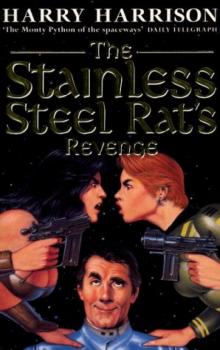 The Stainless Steel Rat's Revenge
The Stainless Steel Rat's Revenge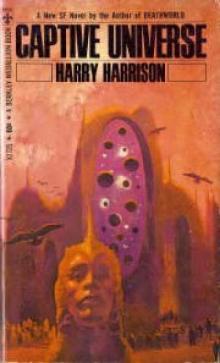 Captive Universe
Captive Universe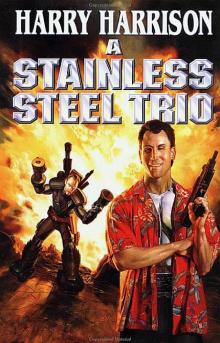 The Stainless Steell Rat Sings the Blues ssr-8
The Stainless Steell Rat Sings the Blues ssr-8 Harry Harrison! Harry Harrison!
Harry Harrison! Harry Harrison!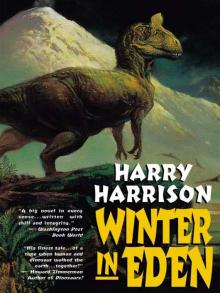 Winter in Eden
Winter in Eden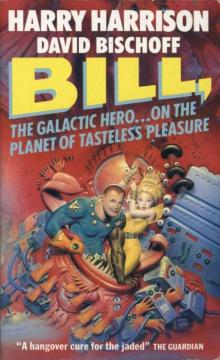 On the Planet of Tasteless Pleasures
On the Planet of Tasteless Pleasures